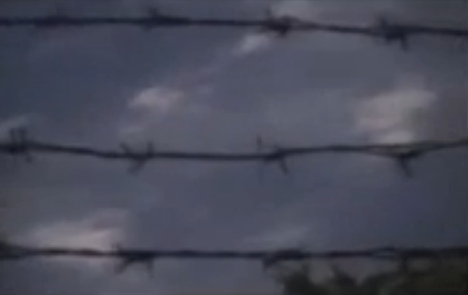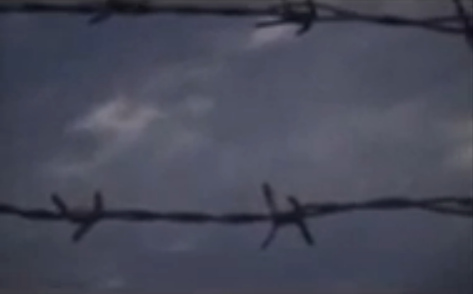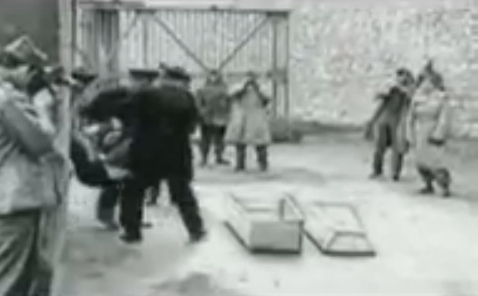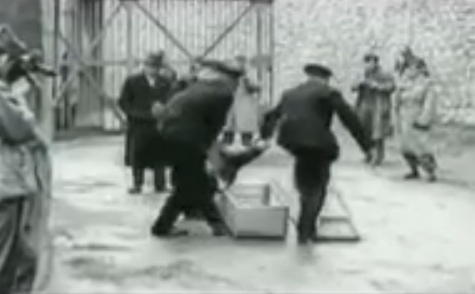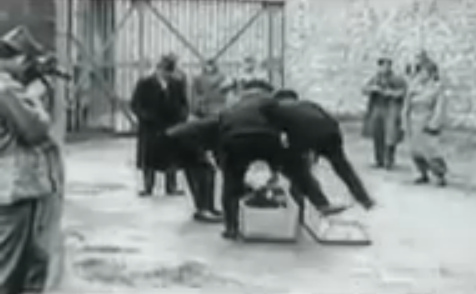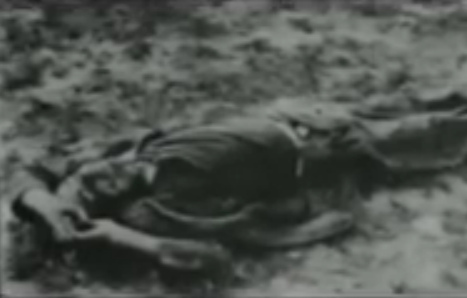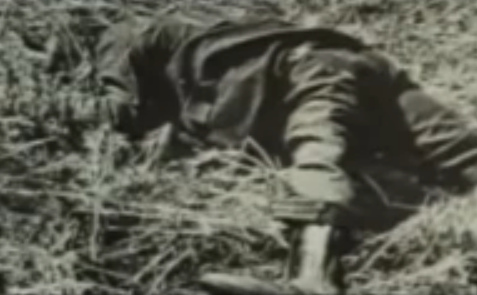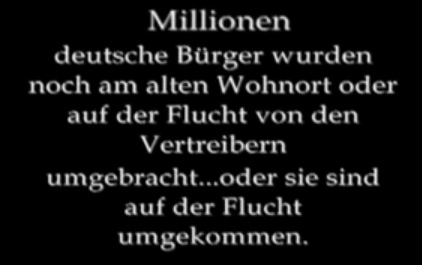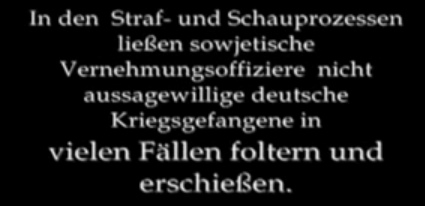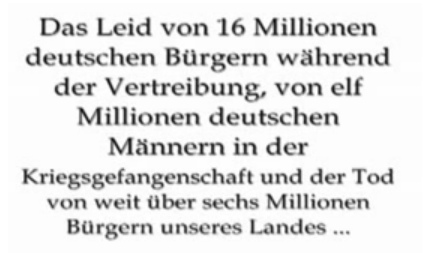<< >>
D ESP
The Rhine meadow camps in summer 1945 (part 2)
Part 2: Video: <Rhine meadow camps - incredibilities> (35min.) - original films, testimonies - about 1 million lethal victims - 10,000s of German bodies under the Rhine meadows - 100,000s of German bodies in Belgium
An "American" soldier guarding Germans in a Rhine meadow camp in a cage with barbed wire [32]
A field of dead bodies with German bodies, guarded by an "American" soldier in a warm coat (24min. 36sec.) [118]
Mass murder of racist Zionist "Americans" in the "American" zone in 1945
Protocol of the Video "The Rhine meadow camps" (orig. in German: "Die Rhine meadow camp")
http://www.youtube.com/watch?v=Z3bmKhBKZO8
by Michael Palomino (2013)
| Teilen
/ share: |
Facebook |
|
Twitter
|
The map with the Rhine meadow camps
Map of remnant Germany with the Rhine meadow camps in summer 1945
1. Büderich
2. Rheinberg
3. Wickrathberg
4. Remagen
5. Sinzig
6. Siershahn
7. Andernach
8. Diez
9. Urmitz
10. Koblenz
11. Dietersheim
12. Heidesheim
13. Hechtsheim
14. Winzenheim / Bretzenheim
14. Biebelsheim
15. Bad Kreuznach
16. Ludwigshafen
17. Böhr-Iggelheim
18. Heilbronn (am Neckar)
Part 2: Video: <Rhine meadow camps - incredibilities> (35min.) - original films, testimonies - about 1 million lethal victims - 10,000s of German bodies under the Rhine meadows - 100,000s of German bodies in Belgium
German soldiers without rights after the end of the war: no rights and deprivation of all possessions
http://www.youtube.com/watch?v=Z3bmKhBKZO8
Install: <iframe width="600" height="480" src="//www.youtube.com/embed/aZusv0Q-Z20" frameborder="0" allowfullscreen></iframe>
-- historian Dr. Alfred De Zayas claims that there is hardly any research and only few document material ("lack of precise documents", German: "Mangel an konkreten Unterlagen", 23sec.) in respect of crimes of the allies in the post-war area in Germany for learning of it and for respecting the law of nations better in future (1min. 4sec.)
-- during the whole Second World War the Rhine meadow camps are the most terrible time for [the surviving] German soldiers in their life (1min. 10sec.)
German soldiers are beaten by the "Americans" with machine guns [3]
Rhine meadow caps - the planned death by the victorious power [4]
-- at May 8, 1945, there are festivities celebrating the capitulation of Germany in the whole world (1min. 45sec.)
-- also in Germany there is a "day of liberation" on every May 8, 1945, but there is also another side of the medal (1min. 55sec.)
"In 1945 the allied liberated millions of Germans from their possessions, from their home, and from their life." (2min. 6sec.)
(orig. in German: "1945 befreiten die Alliierten Millionen Deutsche von ihrem Besitz, ihrer Heimat, und ihrem Leben." (2min. 6sec.)
-- "At the end of the war there were 11 million German soldiers in the hands of the victorious powers (2min, 12sec.), about 8 million of them were in the hands of the British and the 'Americans' " (2min. 17sec.)
(orig. in German: "zu Kriegsende befanden sich rund 11 Millionen deutsche Soldaten in den Händen der Siegermächte (2min. 12sec.), davon etwa 8 Millionen in den Händen von Briten und Amerikanern" (2min. 17sec.)
-- German soldiers of the Rhine meadow camps had to die by "Hunger, cold, and murder" ("Hunger, Kälte und Mord") (2min. 41sec.)
Body check with German soldiers in 1945 [5]
German soldier is taken with risen hands [6]
(seems to be an old man of "Volkssturm")
Rhine meadow camp with Jeep guard [7]
-- according to the peace conference of The Hague, the agreement of The Hague, violence against defenseless people and against prisoners of war should be excluded, and according to resolutions of 1929 prisoners of wars should get the same food and housing as the local army gets (2min. 41sec.-4min.22sec.)
Rhine meadow camp, queue with German soldiers [8]
Rhine meadow camp, queue with German soldiers 02 [9]
Rhine meadow camp, German soldier with a bandage of the eye in the queue [10]
[Well, Hitler also did not keep any peace and "order" but he also was bombing masses of towns in England, France, Belgium and Holland and Poland and Russia etc., and at the end he fired rockets to England, and he was eliminating captives systematically in tunnel constructioning works, and at the end some groups were even blasted into the tunnels living yet not being parts of the enemy's prey etc. etc. According to this state of documents racist Zionists Roosevelt, Eisenhower, Morgenthau and Baruch and their Zionist staff wanted a little "revenge". And they applied Nazi tactic of kin liability].
-- testimony of Dr. Richard M. Müller who had been in the Rhine meadow camp in Remagen,
-- Dr. Müller giving his testimony: the shock was enormous, first in Niederbreisig [camp], then in Remagen [camp], we were chased from the lorries and all German soldiers had to pass a "lane" for reaching the entrance gate of the camp. Criminal "American" soldiers were shouting "Come on - let's go" and they were beating us with wooden slats on our backs. And from this moment on we expected that anything was possible (4min. 50sec-5min. 52sec.)
-- principally the Rhine meadow camps had to be under the control of the International Red Cross, but also in this point nothing was fulfilled and the law is like this that "After the end of the fights all prisoners have to be released as soon as possible." Also this extension of the Geneva Convention had been signed by the "Americans" (5min. 52sec.-6min. 15sec.)
-- but in 1943 the Allies were taking the resolution together that German prisoners of wars should not be "prisoners of wars" anymore but they should be treated like "criminal prisoners". Thus the law of nations was abrogated for the German soldiers (6min. 15-28sec.)
-- "The supreme commanders of the forces should have the possibility to dispose of the captives freely as they wanted." (6min. 28-36sec.)
(orig. German: "Die jeweiligen Oberkommandierenden der Streitkräfte sollten über die Gefangenen frei verfügen können" (6min. 28-36sec.).
And thus the supreme commander of the "U.S." troops, Zionist half Jew and Bible Jehova racist Eisenhower, got such a freedom to handle the German soldiers. On March 19, 1945, this Zionist and Bible Jehova racist Eisenhower became the authority not to dismiss the German soldiers but he was treating the German soldiers after the war as "disarmed enemy forces" (DEF) and thus he was keeping them in the camps as long as he wanted (6min. 36sec.-7min. 5sec.)
International law was not valid for German soldiers but arbitrariness of the "victorious powers" is ruling (7min. 5-15sec.)
Witness Josef Dressen is describing how the criminal "Americans" were even rejecting food from the Red Cross for the German prisoners of war [13]
-- in the Russian zone war a big emergency situation also for the Russian occupants, but in the "American" zone the "Americans" even rejected relief supplies from aid organizations for German prisoners of war because the "American" government with Roosevelt (Zionist Jew, originally Rosenfelt) - together with chief commander Eisenhower (a half Jew, Zionist and a Bible Jehova racist) - they wanted to see the German soldiers perish by hunger (7min. 5-56sec.)
-- principally there were camps for German soldiers prepared in France, but the order of Eisenhower was another one to install new "camps" on the meadows, and thus German soldiers were not shifted to northern France:
<After crossing the Rhine in March 1945 the "Americans" decided that German prisoners of war should not go to the foreseen camps in northern France.> (7min. 56sec.-8min. 11sec.)
(orig. in German: <Nach Überquerung des Rheins im März 1945 beschlossen die "Amerikaner", dass sie die deutschen Kriegsgefangenen nicht in die für sie vorgesehenen Lager nach Nordfrankreich bringen wollten.> (7min. 56sec. bis 8min. 11sec.)
<According to the instruction of Eisenhower they [criminal "Americans"] began to install camps for German prisoners of war on the green meadow on the western side of the Rhine.> (8min. 11-23sec.)
(orig. German: <Sie [die kriminellen "Americans"] begannen auf Weisung Eisenhowers, entlang des westlichen Rheinufers für die deutschen Kriegsgefangenen Lager auf der grünen Wiese anzulegen.> (8min. 11-23sec.)
-- the "Americans" prepared 188 camps for German soldiers, dozens of them on the Rhine and near the Rhine between Remagen and Ludwigshafen (8min. 23-41sec.)
-- other camps in other regions were eliminated and German prisoners of war were [deliberately] deported to the Rhine meadow camps (8min. 41-48sec.)
-- registration of German soldiers was deliberately not done eliminating any tracks of the big crime. There are no statistics about "numbers of inmates" or "origin" etc. Only some cases of coming and leaving inmates are registered by Red Cross in the Red Cross documents and by documents of the tracing service (8min. 48sec.-9min.3sec.)
"Americans" installing Rhine meadow camps 05, installing poles [20]
"Americans" installing Rhine meadow camps 06, installing barbed wire [21]
Here is a report of the Red Cross about the conditions in a Rhine meadow camp:
-- International Red Cross was denied any access to the Rhine meadow camps and thus the Red Cross could not perform any registration at all. It can be estimated that between April and September 1945 there were about 5 million German soldiers in the Rhine meadow camps (9min. 3-27sec.).
-- among the captives were also old men and youth of "Volkssturm", civilists in uniforms (for example firemen), party leaders, simple party members, wounded on holiday at home, women of the flak and of the news service, heavily injured, and youths who had not done anything (9min. 50sec.-10min 20sec.).
Also women who had been flak assists and assists in the news service were detained by the allies [26]
-- thus many people were detained who were not soldiers at all and their detention was absolutely against any law. This can only mean that the allies simply wanted to detain as many Germans as possible (10min. 20-28sec.)
-- the aim of "American" GIs is to give the "German soldier" the "feeling of a defeat" (10min. 20-46sec.).
-- there are the following procedures: torture in any form before and after the capitulation, simulation of executions, detention of boys and youths coming only in a night dress (10min. 46sec.-11min. 5sec.)
-- sometimes "Americans" also showed a correct behavior (11min. 5-7sec.)
-- the big part of the surviving German soldiers was reporting that the "Americans" had performed a body search and had stolen everything from them: cameras, watches, even wedding rings (11min. 7-25sec.)
-- thus German soldiers invent a new meaning for the the name of "U.S.A.": watch collecting army (German: Uhren-sammelnde Armee") (11min. 25-33sec.)
"American" executing a body search with a German soldier [28]
"Americans" executing body searchs with German soldiers [29]
-- watches were given in Germany for Communion or Confirmation, and this did not exist in the "U.S.A.", and thus the "Americans" were stealing all watches they could see from the German soldiers (11min. 33-44sec.)
-- often the "Americans" were also robbing all hygiene items, shaving items, knife and fork, plates or cups, any protection from wet weather and also rain flies (11min. 44-57sec.).
The structure of the Rhine meadow camps
The cages, the killings and the shootings of the shit "Americans"
-- most of Rhine meadow camps were projected for 100,000 persons (11min. 58sec.-12min. 5sec.)
-- the camps consisted of a big square and of a free meadow with fences and parted into sectors, these sectors were called "cages" (12min. 5-15sec.)
Aerial photo of a Rhine meadow camp showing the square as a base parted into other squares [30]
-- a "cage" had the size of 250 to 250 meters (12min. 15-20sec.)
-- according to the "cage" there were 5,000 to 15,000 detainees in one cage (12min. 20-26sec.)
Rhine meadow camp, little tents on naked earth [31]
-- the "cages" were guarded from all sides, in the night with floodlight (12min. 26-33sec.)
-- trials for flights were interrupted at once by killing by shooting (12min. 33-37sec.)
-- from time to time there was also shot into the camp "just for fun" into the mass of German soldiers (12min. 37-42sec.)
Witness Heinz Matthias: queue of 14 hours for getting a tin of drinking water
-- the camps were on a meadow or on an acre, without any house or tent, without coat, day and night in the mud, captives were with lice everywhere (12min. 42sec.-13min. 0sec.)
-- one had to make the queue for 14 hours for getting a tin of drinking water standing up to the wrinkles in the mud, and captives not standing this through were simply sinking down to the ground and dying, no person helped them or was giving water to a person who had sunk to the ground (13min. 0-17sec.)
Quotation:
Water in a Rhine meadow camp
Water supply in a Rhine meadow camp [strongly with chlorine] [36]
Water supply in a Rhine meadow camp on the knees before a water barrel [37]
Water supply in a Rhine meadow camp on the knees on a water tap with a cup of plate [38]
Trying the water [with a strong smell of chlorine] [39]
"We lay in our little camp - there were several camps - many thousands were on the acre, without housing, without tent, mostly without coat, day and night in the mud, totally with lice. Me myself had to make the queue for water during 14 hours up to my wrinkles in the mud for getting one tin of water. Who did not stay this through was sinking down to the ground and was rated to be dead. No person was helping him giving him some water."
(orig. in German: "Wir lagen in unserem kleinen Lager - es waren mehrere Lager - zig Tausend auf diesem Acker, ohne Haus, ohne Zelt, weithin ohne Mantel, Tag und Nacht im Schlamm, total verlaust. Ich selber habe 14 Stunden Schlange gestanden, bis zu den Knöcheln im Schlamm, um eine Konservendose Wasser zu bekommen. Wer das nicht schaffte, kippte um und gehörte dann zu den Toten. Kein Mensch ist gekommen und hat denen das Wasser gereicht."
The guards are mostly "American" soldiers of second grade
-- German soldiers were guarded mostly by "American" soldiers of second grade, also blacks, also Polish assistant troops, partly even by foreign workers (13min. 14-30sec.)
-- the commander mostly were white "Americans", often brutal, arrogant, fury and aggressive, pleads and appeals were answered with beating (13min. 30-44sec.)
"American" guard with shooting gun in his hand shutting a gate made of barbed wire [40]
Black "U.S." army member standing before a wooden wall [41]
-- former soldiers of Waffen SS were especially tortured and were forced to exercises for hours and sometimes they were beaten to death (13min. 44-56sec.)
German captives sitting and lying on a meadow [42]
German captives sitting and lying on a meadow 02 [43]
-- also high German officers were abused (13min. 56sec.-14min. 2sec.)
Torture of Germans in Rhine meadow camps in 1945
Torture position on the knees with the hands bound on the back [44]
Tortured German woman on a meadow [45]
Tortured, dead German men on a meadow [46]
Tortured, dead German men on a meadow 02 [47]
Tortured, dead German women on a meadow [48]
"American" investigations
"American" investigations confirm more war crimes:
-- 104 German prisoners of war suffer a death by suffocation during an "American" rail transport (14min. 2-13sec.)
-- 24 German prisoners and 3 civilians were killed near Tambach [in Franconia] (14min. 13-18sec.)
Report about "American" war crimes in Germany 1945 01 [49]
Report about "American" war crimes in Germany 1945 02, suffocation during a transport of prisoners [50]
-- in Luxembourg "U.S." soldiers were murdering 70 German prisoners of war (14min. 18-22sec.) [troops of General Patton?]
Report about "American" war crimes in Germany 1945 03, murders near Tambach [51]
Transports to the camps in cattle cars and lorries
-- German soldiers came in cattle cars and on lorries herded like animals (14min. 22-33sec.)
Arrival of German soldiers in a lorry like animals [53]
Shit "Ami" herding German soldiers on a lorry like animals [54]
German soldiers getting on a cuttle car [55]
German soldiers getting on a cuttle car 02 [56]
-- then the German prisoners of war were given like rubble to the Rhine meadow camps behind barbed wire (14min. 33-38sec.)
-- some of the German prisoners of war are dying during the transport already (14min. 38-42sec.)
Camp life: desert of mud - dugouts
-- camp life was without goal, all could happen, above all there was the fight for survival (14min. 42-53sec.)
-- first it could be that the German prisoner of war was on a meadow in the sun, but then the ground of the Rhine meadow camps was converted into a desert of mud without days (14min. 53sec.-15min. 15sec.)
German soldiers on a meadow in the sun, summer 1945 [57]
German soldiers on a meadow, summer 1945 [58]
Witness Dr. Richard M. Müller:
"And then we were on a meadow. After three days this meadow was converted into a desert of mud. I don't know any more if this had been an acre or a meadow." (15min. 15-20sec.)
(orig. in German: "Und dann standen wir da auf der Wiese. Nach drei Tagen war das eine Schlammwüste. Ich weiss gar nicht mehr, ob es sich um ein Feld oder um eine Wiese gehandelt hat." (15min. 15-20sec.)
-- in the camps with "American" leadership every detained person had 3 to 5 m2 theoretically (15min. 20-27sec.)
-- tools and housing material were not available for having a normal camp (15min. 27-34 sec.)
-- one had to organize cardboard and with empty tins or with some forks or spoons one had to dig "fox's dens" (15min. 34-44sec.)
-- 3 to 5 prisoners were sharing such a "den" "which was not at all big but all had to lie on the side for sleeping (15min. 44-50sec.)
(orig. in German: 3 bis 5 Gefangene teilten sich dann einen "Bau", "der so gross war, dass sie alle auf der Seite liegen konnten" (15min. 44-50sec.)
German prisoners of war in a Rhine meadow camp digging their dens [61]
German prisoners of war in a Rhine meadow camp with fox's dens, 3 to 5 persons in every den [62]
Weather: wet spring
-- Spring of 1945 was wet and cold, and German prisoners of war who were affected badly already came directly into the desert of mud with cold and partly there was even snow yet (15min. 50sec-16min. 4sec.) [and in most of the Rhine meadow camps there was a steady cold wind]
Rhine meadow camp in spring 1945, puddle with rain and snow 01 [63]
Rhine meadow camp in spring 1945, puddle with rain and snow 02 [64]
Witness Ernst Albrecht on an acre 01, shoes [65]
Witness Ernst Albrecht on an acre 02, profile [66]
Witness Ernst Albrecht on an acre 03, panorama [67]
-- the captives had to dig sinks with tins and had to protect themselves with blankets from the rain until also the blankets were wet (16min. 4-37sec.)
Rhine meadow camp with persons and earth holes [69]
Rhine meadow camp in the rain, protection only with blankets until they were "wet" [70]
Food: cookies, dried beans, hardly water
-- the camps were also called "hunger camps" (16min. 39sec.)
-- often there was only one cookie per day or dried beans, drinking water was not available (16min. 40-46sec.)
Rhine meadow camp with persons and earth holes [71]
Rhine meadow camp, two persons at a barbed wire fence [72]
"American" Zionist racist camp management under Zionist and Bible Jehova racist Eisenhower forbidding dens
-- again and again the dens were prohibited (16min. 46-48sec.)
-- German prisoners of war were forced to fill up their dens (16min. 48-52sec.)
Rhine meadow camps in summer, German women prisoners of war in the sun on the earth, no dens [73]
Field which had been a Rhine meadow camp in former times [74]
-- dugouts were collapsing during the rain because the ground is becoming soft, or "American" bulldozers are destroying all dugouts filling up the holes where captives are living yet but don't have the force to come out any more, they simply were buried alive and the sinkhole was steamrolled and closed (16min. 52sec-17min. 8sec.)
-- tents were not given whereas there were plenty of tents in the deposits of German Wehrmacht and also in the deposits of the "U.S." army (17min. 8-16sec.)
German prisoners of war with blankets as a protection from the sun, summer 1945 (17min. 12sec.) [75]
Arriving German prisoners of war, one with a big peace of cardboard (17min. 15sec.) [76]
-- about 40% were living in dugouts, only about 5% had the luck having a tent (17min. 16-27sec.)
German prisoners of war on a field behind mesh wire (17min. 20sec.) [77]
German prisoners of war with thick coats on a dry ground in a cage with barbed wire fence (17min. 26sec.) [78]
-- witness Dr. Richard M. Müller: The rest had to camp without roof on the meadow, also during wet March and April 1945 and mainly people were not sitting but upright standing (17min. 28-53sec.)
Eye witness for the Rhine meadow camp of Remagen, Prof. Dr. Richard M. Müller, portrait (17min. 36sec.) [79]
-- witness Dr. Richard M. Müller: the German soldiers in captivity were only with their uniform, mostly their coat was taken away (17min. 53sec.-18min. 19sec.)
"Wir haben - ich persönlich hatte - andere länger - haben vier Wochen auf dem Acker gelebt zu einer Zeit im Frühjahr, wo nach anfänglich warmem Wetter dann das typische März-April-Wetter einsetzte: Kalt, nass, Regen. Und, da man sich ja nirgendwo niederlassen konnte, haben wir hauptsächlich gestanden oder sind auf [...] gegangen." (17min.53sec. bis 8min.2sec.)
"Im Schnitt muss man sagen - also die meisten - ich kann das nicht quantifizieren - nichts hatten, ausser ihrer normaler Uniform, nicht einmal Stoffmäntel, die ihnen abgenommen worden waren. Es gab ein paar, die Zeltplanen hatten, aber wirklich nur wenige." (8min. 3-25sec.)
"Ich persönlich hatte durch Zufall in den letzten Kriegstagen einen guten, neuen guten neuen Krad-Mantel [Motorradmantel] bekommen. Den hat man mir aber bei der Gefangennahme abgenommen. Ich habe ihn mir nur beim Abmarsch wieder von dem Haufen mir weggeklaut, so dass ich auf diese Weise in der Beziehung besonders gut gestellt war." (18min. 25-49sec.)
"Es gab nur Schlamm. Es gab keinen trockenen Platz es gab nur Schlamm, und nachts nachts ist man entweder auch nachts weiter herumgewandert, aber irgendwann übermannt einen doch der Schlaf und ich hab' dann meinen Krad-Mantel oben zugemacht, zugebunden, da konnte man Hosen draus binden, und habe mich in den Schlamm kippen lassen und gehofft, dass ich wenigstens ein paar Stunden schlafen kann, ehe mir die Füsse erfrieren." (18min. 49sec. bis 19min. 15sec.)
"We have - me personally - other for a longer time - have lived four weeks on the acre during a spring which was warm at the beginning and then typical March and April weather came: cold, wet, rain. And as there was no comfortable place we mostly were upright standing or we were walking back and forth." (17min. 53sec.-18min. 2sec.)
"In an average one has to say - this counts for the most of the affected - but I cannot indicate quantities - most had nothing but their normal uniform, not even coats which were taken from them. There were some who had rain flies but only few." (8min. 3-25sec.)
"Me personally accidentally I had got a new good coat for motor bike. They took my coat during the detention, but leaving the spot I was stealing my coat from the hip thus I had good life conditions concerning this problem." (18min. 25-49sec.)
"There was only mud. There was no dry place, there was only mud, and during the night one was going on walking around but sometimes sleep was coming and then I closed my coat and one could form trousers with this coat and then I was sinking into the mud and I hoped that I could sleep some hours without frostbite of my feet." (18min. 49sec.-19min. 15sec.)
"American" guard guarding on a hill with a machine gun over a Rhine meadow camp [Remagen] (19min. 27sec.) [80]
Latrines - and falling into it
-- step by step latrines were installed, and the captives were always weaker by undernourishment (19min. 15-27sec.)
-- at the end all were so weak that they were going to the toilet where they just were (19min. 27-37sec.)
Weak German prisoners of wars on the earth in the sun in summer 1945 (19min. 33sec.) [81]
German prisoners of war upright herded like animals (19min. 42sec.) [82]
Eye witness for Rhine meadow camps, Heinz Matthias, portrait (19min. 46sec.) [83]
-- eye witness Heinz Matthias: chalk was needed for the dead bodies, and latrines. And when one was very tired on the latrine and was falling behind then he was sinking and nobody saved him out 819min. 37-57sec.)
-- eye witness Heinz Matthias: Many could only move on all four, one had no force any more to walk upright (19min. 57sec.-20min. 2sec.)
-- eye witness Josef Dressen: There was no help, nobody had the force any more to help the other one (20min. 2-8sec.)
Rhine meadow cap is prepared with hills in the background (20min. 9sec.) [85]
German prisoner of war near a barbed wire fence (20min. 12sec.) [86]
Water: queue of 10 hours
-- watering places were installed only after some time. First water came in barrels. The water was taken from the Rhine or from a creek mostly and chlorine was added banning any danger of epidemics (20min. 8-30sec.)
-- the queue for getting one cup of water was often up to 10 hours (20min. 30-39sec.)
-- some captives were drinking also water from the puddles and they became very sick as one can think. During summer thirst was very bad because there was no protection from heat or sun (20min. 39-57sec.)
Water and cooking in Rhine meadow camps
Cooking area for cooking water or soup, probably grass soup (20min. 14sec.) [87]
German prisoner of war handing his empty tin (20min. 17sec.) [88]
A German prisoner of war is passing with some cups and with a tea-kettle in his hands passing a little fireplace 01 (20min. 21sec.) [89]
A German prisoner of war is passing with some cups and with a tea-kettle in his hands passing a little fireplace 02 (20min. 24sec.) [90]
Loud speaker vehicle with orders of an "American" or given by a corrupt German (20min. 28sec.) [91]
Water station in a Rhine meadow camps adding chlorine and the queue (20min. 31sec.) [92]
Getting water with a cup at the water tap on the ground (20min. 47sec.) [93]
German prisoner of war with a cup of water in the hand (20min. 59sec.) [94]
Rhine meadow camp with a queue in the sun in summer 1945 (21min. 10sec.) [95]
Queue in form of a "U" in a Rhine meadow camp in the sun of summer 1945 (21min. 12sec.) [96]
Queue in a Rhine meadow camp, zoom, in the sun in summer 1945 (21min. 17sec.) [97]
Food in Rhine meadow camps: only 400 to 900 calories per day
-- a human being in quiet position needs 1,200 calories per day. A working human being needs 2,000 to 3,000 calories per day. In the Rhine meadow camps the German prisoners of war received 400 to 900 calories per day, on Sundays there was no food in many camps (20min. 57sec.-21min. 21sec.)
-- new prisoners of war had to wait for two to four days for their first food (21min. 21-26sec.)
Eye witness Prof. Dr. Robert M. Müller reports that he had no digestion during 4 weeks.
Eye witness for the Rhine meadow camp of Remagen Prof. Dr. Robert M. Müller, portrait (21min. 39sec.) [98]
Eye witness for the Rhine meadow camp of Remagen Prof. Dr. Robert M. Müller, portrait with 18 years (22min. 3sec.) [99]
Neighboring villages - forbidden help
-- neighboring dwellers and villages were helping the German prisoners of war with food, but this was forbidden under penalty of death (22min. 30-43sec.)
-- German authorities were ordered to instruct the German population in this way (22min. 43-50sec.)
-- people being catched during giving food to German prisoners of war were expelled or were shot and killed before the eyes of the German prisoners of war (22min. 50sec.-23min. 0sec.)
Herded Rhine meadow camps with German prisoners of war upright at a barbed wire fence (22min. 36sec.) [100]
Instruction to the population with the prohibition to give food to German prisoners of war (22min. 48sec.) [101]
Instruction to the population with the prohibition to give food to German prisoners of war, signature (22min. 52sec.) [102]
Giant Rhine meadow camp in 1945 in remaining Germany, aerial photo (22min. 57sec.) [103]
There was no medicine in the Rhine meadow camps at all
-- medical assistance or medical posts were not existing here, the "Americans" forbid German medical doctors to work. Medicaments and equipment did not exist, German medical doctors were present but there were no remedies, no cures, they only could give advice nothing more. Red Cross had no access to the camps (23min. 0-23sec.).
Man with a white shirt, may be a doctor in a Rhine meadow camp (23min. 4sec.) [104]
Men with white shirts, may be doctors, passing at the border of a Rhine meadow camp (23min. 12sec.) [105]
German prisoners of war on a meadow in the sun in summer 1945 (23min. 15sec.) [106]
German prisoners of war on a meadow in the sun in summer 1945 02 (23min. 20sec.) [107]
German prisoners of war on a meadow in the sun in summer 1945 03 (23min. 26sec.) [108]
Relief supply of Red Cross was rejected by Zionist Jew and Bible Jehova racist Eisenhower
-- Speaker: "Food and relief supply which was sent by Red Cross in trains to the Rhine was rejected and sent back by the order of Eisenhower." (23min. 23-37sec.)
(orig. in German: "Nahrungsmittel und Hilfsgüter, welche das Rote Kreuz in Eisenbahnwaggons an den Rhein transportieren liess, wurden auf Befehl Eisenhowers zurückgeschickt." (23min. 23-37sec.)There was no medicine
-- sick people was not treated in the camps, but only people with dysentery were separated by the "Americans" (23min. 37-44sec.)
-- it can be admitted that 20% got normal nourishment, 60% were undernourished, and 20% were nourished in a way so they died (23min. 44-54sec.)
Rhine meadow camp in Bad Kreuznach with a military hospital for dying people ("field of sorrow")
-- the camp in Bad Kreuznach had a military hospital but only people in a dying process were accepted and then they died within 24 hours (23min. 54sec.-24min. 6sec.)
Stress without end
-- the German prisoners of war were under permanent stress because they did never know what will happen next with them (24min. 6-14sec.)
-- there was no mail, there were no news for them about their families, writing letters was forbidden (24min. 14-31sec.)
German prisoners of war in a queue before the check-in (24min. 8sec.) [111]
German prisoners of war in a queue being searched by an "American" soldier controlling documents (24min. 11sec.) [112]
German prisoner of war with a bound eye (24min. 14sec.) [113]
Burning vehicles, eventually caused by a mine or a trap (24min. 19sec.) [114]
Suicide
-- there is no counting or documentation about suicides in the "American" camps for German prisoners of war (24min. 31-43sec.)
A man hanging on a rope on a tree, presented by an "American" soldier (24min. 21sec.) [115]
A man hanging on a rope on a tree, presented by an "American" soldier, zoom (24min. 25sec.) [116]
German prisoner of war waiting (24min. 29sec.) [117]
<The number of the murdered people and their destinations>
Kind of deaths in the Rhine meadow camps
There is no counting and there are no figures about people who die. The kinds of deaths are
-- by collapsing fox's dens
-- by bulldozing the dugouts
-- by suffocating in the mud
-- by drowning in the latrines or
-- by injuries and illnesses (24min. 43-58sec.)
Field of German dead bodies, guarded by an "American" soldier in a thick coat (24min. 36sec.) [118]
Prepared corpse pit / prepared mass grave for murdered German prisoners of war in summer 1945 (24min. 43sec.) [119]
Prepared corpse pit / prepared mass grave for murdered German prisoners of war in summer 1945 02 (24min. 45sec.) [120]
Fox's den, zoom (24min. 49sec.) [121]
Monument [in Bretzenheim] (24min. 53sec.) [122]
Eye witness Heinz Matthias is indicating: There was only one thing: the will to survive or to perish (24min. 58sec.-25min. 7sec.)
Quotation:
"There was only one thing: the will to survive for getting home or to perish." (24min. 58sec.-25min. 7sec.)
(orig. in German: "Es gab da ja nur eins: Den Willen zum Überleben, um nach Haus' zu kommen, oder aber zu krepieren." (24min. 58sec. bis 25min. 7sec.)
Eye witness for Rhine meadow camps Heinz Matthias (25min. 5sec.) [123]
Barbed wire with blue sky (25min. 11sec.) [124]
Barbed wire with blue sky 02 (25min.12sec.) [125]More kind of deaths in the Rhine meadow camps:
-- by punitive actions with murdering people for example by hanging
-- or shortly before tying the prisoners were brought to an "evacuation military hospital"
-- or they were shot during a flight
-- or they were dying during an arbitrary shooting during the day or in the night (25min. 7-33sec.)
Rhine meadow camp 1945 (?): murder by hanging of Germans by "American" occupation forces
(Control these photos, if these are "American" occupation forces and if this is in a Rhine meadow camp - it seems not! Perhaps this scene is from Poland).
Prisoner is shackled (25min. 16sec.) [126]
Prisoner is prepared with a rope 01 (25min. 19sec.) [127]
Prisoner is prepared with a rope 02: 25min.21sec. [128]
Prisoner is prepared with a rope 03: 25min.24sec. {129]
Prisoner gets a black bag on his head (25min. 27sec.) [130]
Prisoner gets the rope (25min. 29sec.) [131]
Prisoner hanging 01 (25min. 30sec.) [132]
Prisoner hanging 02 (25min. 32sec.) [133]
Murdered prisoner is put into a coffin 01 (25min. 34sec.) [134]
Murdered prisoner is put into a coffin 02 (25min. 38sec.) [135]
Murdered prisoner is put into a coffin 03 (25min. 40sec.) [136]
Dead German soldiers are undressed, put on lorries and shifted - identification tags are melt
-- dead soldiers are undressed by German soldiers, they have to take the identification tags away and the dead bodies are put on lorries, and the "American" lorries are transporting the dead bodies away with "unknown destination" (25min. 33-50sec.)
-- a little part of the deads are buried directly in mass graves near the camps (25min. 50-56sec.) [or they are buried alive in their dugouts when excavators are filling up the dugouts flattening the territories, and the dog tags are not taken from the bodies in these cases but are in the earth yet]
-- the clothes of the dead are burnt and the identification tags are not given to the Red Cross but are probably melt (25min. 56sec.-26min. 11sec.).
Dead German prisoners of war in Rhine meadow camps
German prisoner of war dead on a meadow 01 (25min. 44sec.) [137]
German prisoner of war dead on a meadow 02 (25min. 47sec.) [138]
German prisoner of war dead on a meadow 03 (25min.52sec.) [139]
German prisoner of war dead on a meadow 04 with a cup in his hand (25min. 57sec.) [140]
German prisoner of war dead on a meadow in fresh grass eventually after a flight (26min. 5sec.) [141]
Mass graves with German soldiers in Belgium
-- under many German acres in the Rhine valley are 1,000s of skeletons of German soldiers (26min. 11-31sec.)
An eye witness showing a field where a Rhine meadow camp had been before (26min. 17sec.) [142]
An eye witness showing a field where 1,000s of German prisoners of war are buried, he says (26min. 22sec.) [143]
In the Rhine meadow camp of Bretzenheim for example there are three different variations of graves without name:
-- people who had provoked the anger of the [shit] "Americans" being shot by anger
-- people who were offering resistance or were shot on a flight by the shit "Americans"
-- people who fell into the latrine or were killed by an arbitrary shooting (26min. 31sec.-27min.0sec.)
Officially the [shit] "Americans" claim that there had only been 3,000 deaths. Thus they claim that there had been a death rate of under 1%o. They simply indicate people who have died by diseases as if undernourishment and hunger would not be an illness (27min. 0-25sec.).
Rhine meadow camp in Bretzenheim
Rhine meadow camp of Bretzenheim, memorial plate (26min. 33sec.) [144]
Rhine meadow camp of Bretzenheim, monument (26min. 48sec.) [145]
Rhine meadow camp of Bretzenheim, landscape with hill in the background (27min. 2sec.) [146]
Rhine meadow camp of Bretzenheim, landscape with hill in the background 02 (27min.10sec.) [147]
Rhine meadow camp of Bretzenheim, landscape with monument (27min. 14sec.) [148]
The road near the former Rhine meadow camp of Bretzenheim (27min. 23sec.) [149]
The road near the territory of the former Rhine meadow camps of Bretzenheim with the monument (27min. 27sec.) [150]
The death rate of today with young men between 20 and 40 because of illnesses is 15 of 1,000. Thus the official "American" figure is just a mockery against German soldiers (27min. 25-55sec.).
Independent historian James Bacque from Canada with his analysis of the Rhine meadow camps in his book "Other Losses" comes to the conclusion that about 1 million German soldiers have died in the Rhine meadow camps (27min. 55sec.-28min. 10sec.).
In the direct surrounding of this camp are 10,000s, but not 100,000s of deaths buried. The mass graves with the 100,000s of German soldiers are not detected yet. "American" lorries regularly came from [the Belgium port of] Antwerp with food for the occupation forces and were returning allegedly "empty" to Antwerp. But the fact is another one: "American" lorries were not "empty" heading for Antwerp, but they were full of German dead bodies discharging the German dead bodies in Belgium. And Belgium has many mass graves with German soldiers which can only be explained by this maneuver, but not by the short military fights of 1940 (28min. 10-59sec.).
Wreath-laying ceremony at the monument of the Rhine meadow camp of Bretzenheim
Book of James Bacque about the Rhine meadow camps "Other Losses", cover [151]
Funeral march for dead German prisoners of war at the site of the Rhine meadow camp in Bretzenheim (27min. 59sec.) [152]
Wreath-laying ceremony for dead German prisoners of war in the Rhine meadow camp of Bretzenheim 01 (28min. 36sec.) [153]
Wreath-laying ceremony for dead German prisoners of war in the Rhine meadow camp of Bretzenheim 02, 28min.59sec. [154]
Wreath-laying ceremony for dead German prisoners of war in the Rhine meadow camp of Bretzenheim 03, 29min.6sec. [155]
Wreath-laying ceremony for dead German prisoners of war in the Rhine meadow camp of Bretzenheim 04, 29min.20sec. [156]
Belgian war graves with German soldiers are full of dead bodies without identification tags. They were taken away after the death in the Rhine meadow camps. German dead bodies were put into the Belgium forests [into mass graves there] like rubble, left and right of the road (28min. 59sec.-29min. 17sec.).
Conclusion: The "liberation" was no "liberation" but it was an "American" occupation
-- the legend of the "liberation" is a big lie (29min. 17-31sec.)
-- under Hitler 7 million Germans died, but after the war after April 1945 12 million Germans were killed (29min. 31-46sec.)
-- one of these 12 million Germans murdered by the allies since 1945 are the German soldiers of the Rhine meadow camps where they died by hunger in the mud under the order of [Zionist racist] "Americans" (29min. 46-58sec.)
The Rhine meadow camps of 1945: It was a systematic [Zionist racist] mass murder against Germans
-- why was there no registration of the German captives?
-- why nourishment was not given and food deposits and deliveries of the Red Cross were not distributed?
-- why the shit "American" military administration was committing "a deliberate policy of omission"?
-- why a honorful burial at the Rhine was forbidden?
-- this is a systematic mass murder and much research is missing yet in this historical field investigating the war crimes of the "U.S.A." completely (29min. 58sec.-30min.48sec.)
-- the aim of this mass murder in the Rhine meadow camps was a "precise reduction of the German population" (30min. 48sec.-31min.4sec.).
Red memorial lights at the monument of Bretzenberg for the deads of the Rhine meadow camp of Bretzenberg (30min. 12sec.) [158]
Red memorial lights at the monument of Bretzenberg for the deads of the Rhine meadow camp of Bretzenberg 02 (30min. 37sec.) [159]
Eye witness Heinz Matthias reporting his coming home
(31min.11-59sec.)
Eye witness for Rhine meadow camps Heinz Matthias, portrait (31min. 11sec.) [160]
Criminal occupation of Germany bi criminal "U.S.A.", British and French since May 8, 1945
Text "Truth": 32min.18sec.
"Truth is different from half truth by describing the compete reality."
(orig. in German: "Die Wahrheit unterscheidet sich dadurch von der Halbwahrheit, dass sie die ganze Wirklichkeit umfasst."
Text "Reality" 32min.26sec.
"In this complete reality also the fact is an element that the occupation after May 8, 1945 in Germany was a complete oppression."
(orig. in German: "Zur ganzen Wirklichkeit zählt auch, dass für die deutsche Bevölkerung die Zeit, die dem 8. Mai 1945 folgte, eine Zeit der puren Unterdrückung war."
Text "Occupation Zones": 32min.38sec.
"The fate of the Germans in the occupation zones was especially bad in the Soviet zone, in the French zone, and in the "American" zone."
(orig. in German: "Das Schicksal der Deutschen war in den Besatzungszonen der Sowjets, der Franzosen und der Amerikaner besonders übel."
Text "12 million Germans": 32min.48sec.
"After May 8, 1945 12 million Germans died by the conditions arranged by the victorious powers."
(orig. in German: "Nach dem 8. Mai 1945 starben 12 Millionen Deutsche an den Folgen der Verbrechen der Siegermächte."
Text "millions of German prisoners of war murdered": 32min.58sec.
"Millions of German prisoners of war were murdered and have died in camps of the victorious powers."
(orig. in German: "Millionen deutsche Kriegsgefangene sind in den Lagern der Siegermächte ermordet worden und umgekommen."
Text "16 million Germans expelled" (33min. 8sec.)
"All in all 16 million Germans had to take their flight from eastern Germany [from today's Poland, CSSR, eastern Prussia, Baltic states etc.] or were systematically expelled. The worst act was the expulsion itself. It was executed with incredible brutality."
(orig. in German: "Insgesamt 16 Millionen Deutsche flohen aus Ostdeutschland [aus Osteuropa: Polen, CSSR, Ostpreussen, Baltenstaaten etc.] oder wurden systematisch vertrieben. Das Erschütterndste war der Akt der Vertreibung selbst. Er wurde mit unvorstellbarer Grausamkeit vollzogen."
Text "Murder even before or during the expulsion" (33min. 20sec.)
"Millions of German citizens were murdered at their old domicile or during their flight by the expellers... or they died during their flight."
(orig. in German: "Millionen deutsche Bürger wurden noch am alten Wohnort oder auf der Flucht von den Vertreibern umgebracht... oder sie sind auf der Flucht umgekommen.")
[-- shooting command on the spot
-- death in the trek
-- allied airplanes bombed refugee ships etc. etc.]
Text "Further kind of deaths" 01 (33min. 29sec.)
"There were more kind of deaths reported in written:"
(orig. in German: "Als weitere Todesursachen sind schriftlich überliefert:"
Text "Further kind of deaths" 02 (33min. 33sec.)
"Death by slapping, shooting, strangulating, drowning, stabbing, death after several violations, death after cutting penis and testicles, crucifying, whip, stamping to death..."
(orig. in German: "Erschlagen, Erschiessen, Erdrosseln, Ertränken, Erstechen, Tod nach mehrfacher Vergewaltigung, Entmannen, Kreuzigen, Totpeitschen, Tottrampeln..."
Text "Further kind of deaths" 03 (33min. 40sec.)
"... burning alive, death by mutilating, rolling in barrels, put into barrels filling the barrel with swill."
(orig. German: "... Verbrennen bei lebendigem Leib, Verstümmeln, zu Tode Rollen in Fässern und Vollpumpen mit Jauche."
"Interrogations" of the criminal allies with torture against Germans without end
Text "Torture and murder by Soviet interrogation officers" (33min. 49sec.)
"In the processes and show processes Soviet interrogation officers often tortured German prisoners of wars and also killed them when they did not want to speak."
(orig. in German: "In den Straf- und Schauprozessen liessen sowjetische Vernehmungsoffiziere nicht aussagewillige, deutsche Kriegsgefangene in vielen Fällen foltern und erschiessen."
Text "Torture by "American" interrogation officers" (33min. 59sec.)
"In many cases American interrogation officers let German prisoners of war in starvation or tortured them with feces thrown over their heads, bags over their heads, slapping them without end getting them "ready" for the interrogation."
(orig. in German: "Amerikanische Vernehmungsoffiziere liessen in vielen Fällen deutsche Kriegsgefangene tagelang hungern, mit Fäkalien übergiessen, Säcke über die Köpfe stülpen, dann auf sie einschlagen, um sie für die Verhöre weichzubekommen."
Text "Torture by "American" interrogation officers at Malmedy process" (34min. 10sec.)
"During Malmedy massacre trial [Dachau] the charged German prisoners of war were driven wood peaced under their finger nails or testicles were crushed forcing them to "confessions"."
(orig. in German: "Im "Malmedy-Prozess" wurden den angeklagten, deutschen Kriegsgefangenen Holzkeile unter ihre Fingernägel getrieben oder die Hoden zerquetscht, um sie zu "Geständnissen" zu zwingen."
"U.S." racist Zionist terrorism with torture without end
Text "Help rejected in the "American" Zone" (34min. 19sec.)
"U.S." military authorities were forbidding to distribute food and tents to the prisoner camps coming from Wehrmacht deposits or from "U.S." deposits. Installation of drinking water and food was also forbidden for the German population..."
(orig. in German: "Die US-Militärbehörde verbot, Verpflegung und Zelte aus Wehrmachts- und US-Depots in den Gefangenenlagern zu verteilen, untersagte, die Bereitstellung von Trinkwasser und Nahrungsmitteln für die deutsche Bevölkerung..."
Text "Destruction of food in the "American" zone" (34min. 29sec.)
"... they ordered in the case of helping civilians to take the food and to destroy it."
(orig. in German: "... befahl, den helfenden Zivilpersonen die Lebensmittel abzunehmen und zu vernichten."
16 million Germans expelled since 1945 should not be minimized
Text "6 million dead Germans during the post-war area 1945-1950" (35min. 5sec.)
"The suffering of 16 million German civilians during their expulsion, of 11 million German men in war imprisonment, and the death of more than six million civilians of our country"
(orig. in German: "Das Leid von 16 Millionen deutschen Bürgern während der Vertreibung, von elf Millionen deutschen Männern in der Kriegsgefangenschaft, und der Tod von weit über sechs Millionen Bürgern unseres Landes..."
Text "Fate being expelled and mass murder of the allied must not be concealed" (35min. 14sec.)
"... after May 8, 1945 is too important and should not be concealed, whereas other people of Germany can say that they felt freed in this time."
(orig. in German: "... nach dem 8. Mai 1945 ist zu bedeutend, als das es neben der Erleichterung derer, die sich praktisch befreit sahen, von damals an diesem Tag verschwiegen werden dürften!"
Volksfront Media, logo (35min. 27sec.)
| Teilen
/ share: |
Facebook |
|
Twitter
|










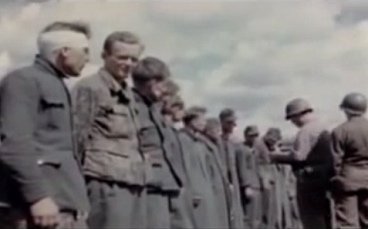






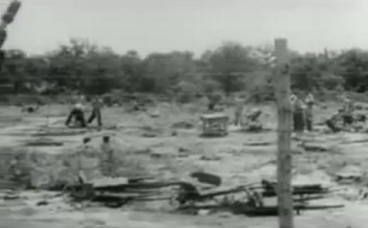
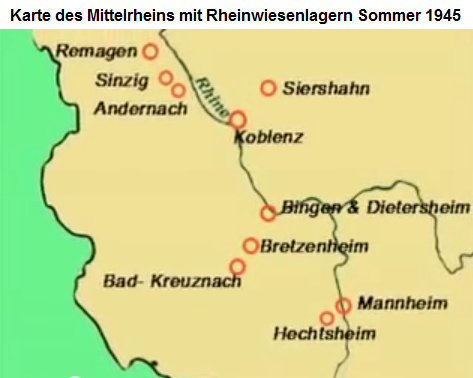













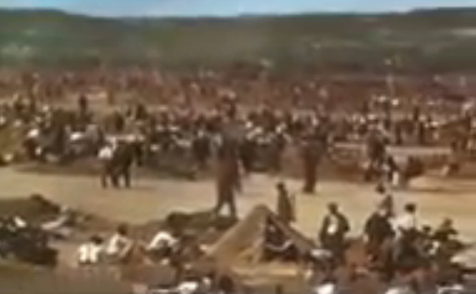
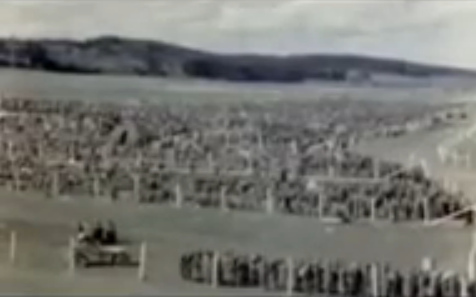


![Water supply in a Rhine
meadow camp [strongly with chlorine] Water
supply in a Rhine meadow camp [strongly with
chlorine]](002-d/036-water-supply-w-chlorine-Rhine-meadow-camp.jpg)


![Trying the water [with a
strong smell of chlorine] Trying the water [with a strong smell of
chlorine]](002-d/039-Rhine-meadow-camp1945-water-tasting.jpg)


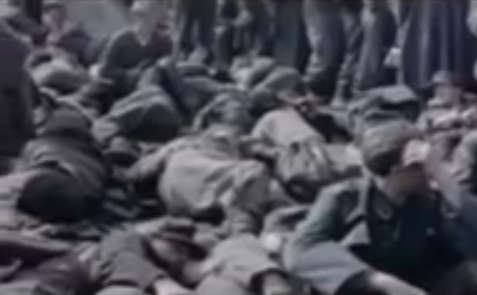
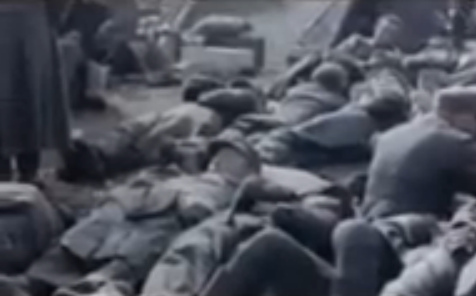
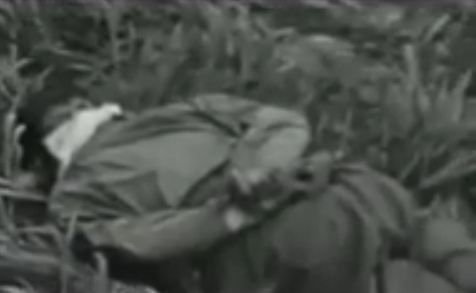








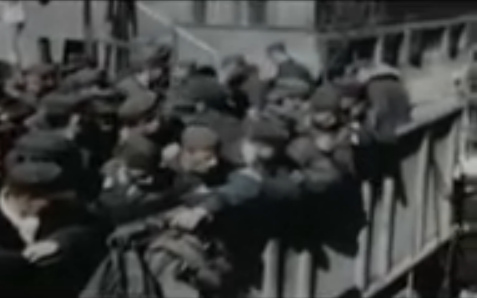
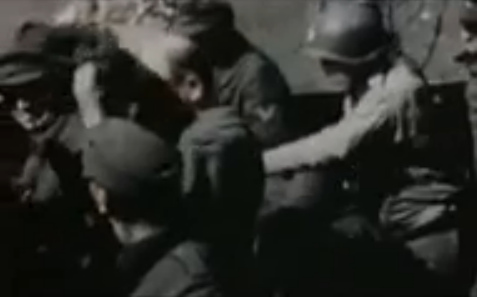





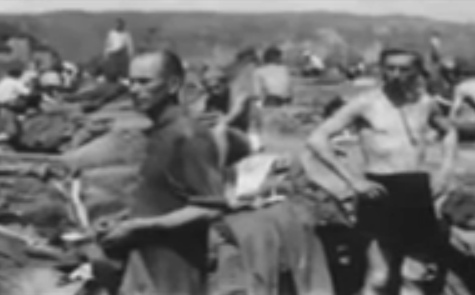



























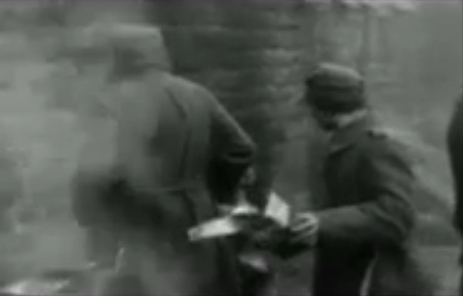






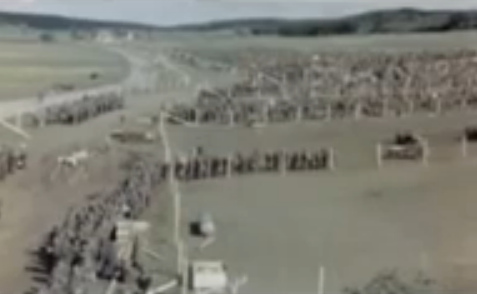
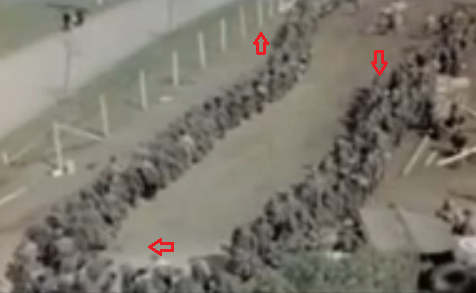





















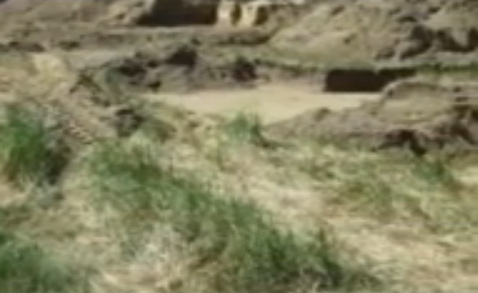
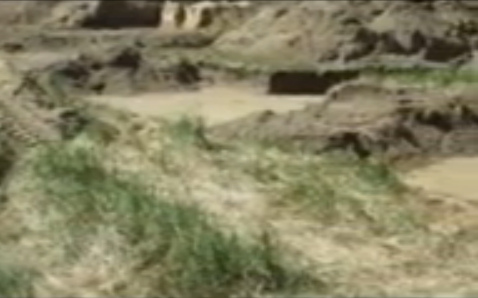

![Monument [in Bretzenheim]
(24min. 53sec.) Monument [in Bretzenheim] (24min.
53sec.)](002-d/122-Rhine-meadow-camp-Bretzenheim-monument.jpg)

